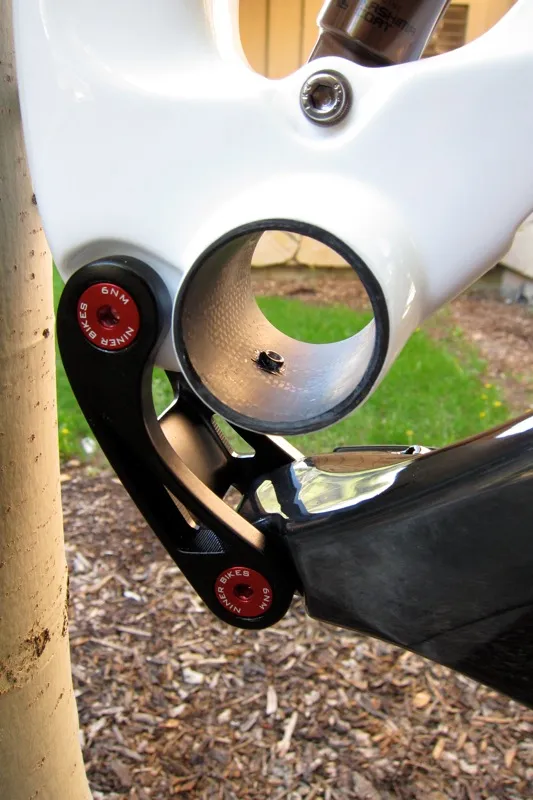Niner’s new carbon Jet 9 carries the tag ‘RDO’ which stands for Race Day Optimized. Despite the tagline, the carbon frame, which is said to be stiffer and over 1.5lb lighter than the alloy model, will undoubtedly suit trail riders as well as racers due to an increase in travel — to 100mm — and the fact it’s covered by Niner's C5 carbon warranty.
The new bike, which will be in select shops this week, builds upon the pedigree of the alloy model, which was launched three years ago. While travel has been increased, geometry is the same when using a 100mm-travel fork. However, Niner also publish the angles for the bike equipped with a 120mm fork.
George Parry, head of Niner’s engineering department, has been riding a prototype of the Jet 9 Carbon with a 120mm fork and says he likes the way it mellows out the handling and adds to its capabilities over rough terrain. “A lot of our testers have been running it with 120 [forks] and have been really happy with it,” said Carla Hukee, Niner’s brand manager. “It’s a pretty [versatile] frame in that sense.”
A feature-packed 5lb package
The Jet 9 Carbon features most of the industry’s in-vogue standards for carbon construction and contemporary frame design. The bikes are monocoque molded using a sacrificial mandrel in the head tube area, which allows for precise material placement and allows Niner to achieve a light overall weight; they claim 5.1lb for small frame with Fox’s RP23 Adaptive Logic shock with Kashima coat, a package which costs US$2,599.

Niner's shock spec is dramatically changed for 2012; they now use a high volume air can with less compression damping and more rebound damping (medium tunes for both). Boost Valve pressure is set at 200psi
Instead of modifying layup from size to size — Niner offer small through extra large — they modify the actual tube diameters. Chris Sugai, Niner’s co-founder, says that by modifying the diameter, rather than the layup, they preserve the impact resistance built into the layup while reducing weight and tuning the ride to the riders’ size.
The new bike comes complete with a tapered, ZeroStack head tube, and uses the same head badge as the Air 9 Carbon, which serves to seamlessly internally route the cables through the down tube; from the down tube Niner run a full length of housing to the rear derailleur.

The RDO shares its cable routing head badge with the Air 9 Carbon
The bottom bracket shell is made entirely from carbon using the Press Fit 30 standard, the front derailleur uses the direct mount E-type standard and the rear brake caliper mounts via a 160mm, direct post mount. The rear axle maintains the 9mm quick-release standard.
“We looked at the 142mm through-axle on this, but it all depends on the design of your rear triangle,” says Sugai. “We found on our design, the stiffness gain wasn’t enough to justify the addition. Part of it, too, is that it’s a race bike and a quick-release offers faster tire changes and so forth.” Sugai says the frame will fit tires up to 2.35in, further increasing its abilities off the racecourse.
Patented suspension
More than four years ago Niner applied to patent their CVA suspension system — namely the placement of the lower pivot below the bottom bracket and significantly lower than the axle line — which is said to remain active in all circumstances and work optimally in all three chainrings, rather than just the middle or large rings.
The patent was, finally, issued last month, almost perfectly timed for the launch of the Jet 9 Carbon. Niner equip their pivots with Enduro Max cartridge bearings for smooth action and durability.

The RDO uses a PressFit30 bottom bracket shell molded entirely from carbon; below the BB sits Niner's newly patented CVA linkage
And a solid warranty to boot
The C5 warranty is offered on the new bike, as well as all of Niner’s carbon products, and isn’t voided by racing. “We encourage people to race our products," says Sugai. “It would be ironic to call it ‘RDO’ and not cover racing with our warranty,” says Hukee.

Well, it is a race bike












